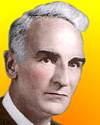 (source)
(source)
|
Eric Temple Bell
(7 Feb 1883 - 21 Dec 1960)
Scottish-American mathematician and writer who contributed to analytic number theory. He wrote for the layman in Men of Mathematics (1937).
|
Science Quotes by Eric Temple Bell (28 quotes)
“Obvious” is the most dangerous word in mathematics.
— Eric Temple Bell
In The Queen of the Sciences (1938), 14.
[As a young teenager] Galois read [Legendre's] geometry from cover to cover as easily as other boys read a pirate yarn.
— Eric Temple Bell
Men of Mathematics (1937, 1986), 364.
Abstractness, sometimes hurled as a reproach at mathematics, is its chief glory and its surest title to practical usefulness. It is also the source of such beauty as may spring from mathematics.
— Eric Temple Bell
In 'General Prospectus', The Development of Mathematics (1940, 2017), Chap. 1, 9.
Art is usually considered to be not of the highest quality if the desired object is exhibited in the midst of unnecessary lumber.
— Eric Temple Bell
In Mathematics: Queen and Servant of Sciences (1938), 20. Bell is writing about the postulational method and the art of pruning a set of postulates to bare essentials without internal duplication.
Commenting on Archimedes, for whom he also had a boundless admiration, Gauss remarked that he could not understand how Archimedes failed to invent the decimal system of numeration or its equivalent (with some base other than 10). … This oversight Gauss regarded as the greatest calamity in the history of science.
— Eric Temple Bell
In Men of Mathematics (1937), 256.
For some months the astronomer Halley and other friends of Newton had been discussing the problem in the following precise form: what is the path of a body attracted by a force directed toward a fixed point, the force varying in intensity as the inverse of the distance? Newton answered instantly, “An ellipse.” “How do you know?” he was asked. “Why, I have calculated it.” Thus originated the imperishable Principia, which Newton later wrote out for Halley. It contained a complete treatise on motion.
— Eric Temple Bell
In The Handmaiden of the Sciences (1937), 37.
Guided only by their feeling for symmetry, simplicity, and generality, and an indefinable sense of the fitness of things, creative mathematicians now, as in the past, are inspired by the art of mathematics rather than by any prospect of ultimate usefulness.
— Eric Temple Bell
In The Queen of the Sciences (1938), 2.
I have always hated machinery, and the only machine I ever understood was a wheelbarrow, and that but imperfectly.
— Eric Temple Bell
In 'The Queen of mathematics', The World of Mathematics (1956), 515.
If “Number rules the universe” as Pythagoras asserted, Number is merely our delegate to the throne, for we rule Number.
— Eric Temple Bell
In Men of Mathematics (1937), 16.
If a lunatic scribbles a jumble of mathematical symbols it does not follow that the writing means anything merely because to the inexpert eye it is indistinguishable from higher mathematics.
— Eric Temple Bell
In Men of Mathematics (1937), Vol. 2, 232. Also in J.R. Newman (ed.) The World of Mathematics (1956, 1960), Vol. 1, 308.
In his wretched life of less than twenty-seven years Abel accomplished so much of the highest order that one of the leading mathematicians of the Nineteenth Century (Hermite, 1822-1901) could say without exaggeration, “Abel has left mathematicians enough to keep them busy for five hundred years.” Asked how he had done all this in the six or seven years of his working life, Abel replied, “By studying the masters, not the pupils.”
— Eric Temple Bell
The Queen of the Sciences (1931, 1938), 10.
It is the perennial youthfulness of mathematics itself which marks it off with a disconcerting immortality from the other sciences.
— Eric Temple Bell
In The Queen of the Sciences (1938), 5.
Many an otherwise good cathedral has been ruined by too many gargoyles.
— Eric Temple Bell
In Mathematics: Queen and Servant of Sciences (1938), 20. Bell’s context is that “Art is usually considered to be not of the highest quality if the desired object is exhibited in the midst of unnecessary lumber.” He is writing about the postulational method and the art of pruning a set of postulates to bare essentials without internal duplication.
Mathematical “truth” is no “truer” than any other, and Pilate’s question is still meaningless. There are no absolutes, even in mathematics.
— Eric Temple Bell
In 'What Mathematics Has Meant to Me', Mathematics Magazine (Jan-Feb 1951), 24, 161. [Note: Pontius Pilate questioned Jesus, “What is truth?” (John 18:38). —Webmaster]
No man who has not a decently skeptical mind can claim to be civilized. Euclid taught me that without assumptions there is no proof. Therefore, in any argument, examine the assumptions. Then, in the alleged proof, be alert for inexplicit assumptions. Euclid’s notorious oversights drove this lesson home. Thanks to him, I am (I hope!) immune to all propaganda, including that of mathematics itself.
— Eric Temple Bell
In 'What Mathematics Has Meant to Me', Mathematics Magazine (Jan-Feb 1951), 24, 161.
Objections … inspired Kronecker and others to attack Weierstrass’ “sequential” definition of irrationals. Nevertheless, right or wrong, Weierstrass and his school made the theory work. The most useful results they obtained have not yet been questioned, at least on the ground of their great utility in mathematical analysis and its implications, by any competent judge in his right mind. This does not mean that objections cannot be well taken: it merely calls attention to the fact that in mathematics, as in everything else, this earth is not yet to be confused with the Kingdom of Heaven, that perfection is a chimaera, and that, in the words of Crelle, we can only hope for closer and closer approximations to mathematical truth—whatever that may be, if anything—precisely as in the Weierstrassian theory of convergent sequences of rationals defining irrationals.
— Eric Temple Bell
In Men of Mathematics (1937), 431-432.
Poincaré was a vigorous opponent of the theory that all mathematics can be rewritten in terms of the most elementary notions of classical logic; something more than logic, he believed, makes mathematics what it is.
— Eric Temple Bell
In Men of Mathematics (1937), 552.
Poincaré was the last man to take practically all mathematics, pure and applied, as his province. … Few mathematicians have had the breadth of philosophic vision that Poincaré had, and none is his superior in the gift of clear exposition.
— Eric Temple Bell
In Eric Temple Bell, Men of Mathematics (1937, 1986), 527.
The bones of Descartes were returned to France (all except those of the right hand, which were retained by the French Treasurer-General as a souvenir for his skill in engineering the transaction) and were re-entombed in what is now the Pantheon. There was to have been a public oration, but this was hastily forbidden by order of the crown, as the doctrines of Descartes were deemed to be still too hot for handling before the people.
— Eric Temple Bell
In Men of Mathematics (1937), 51-52. The remains of Descartes were returned to his native France, seventeen years after he died in Stockholm, Sweden.
The cowboys have a way of trussing up a steer or a pugnacious bronco which fixes the brute so that it can neither move nor think. This is the hog-tie, and it is what Euclid did to geometry.
— Eric Temple Bell
In The Search For Truth (1934), 117.
The full impact of the Lobatchewskian method of challenging axioms has probably yet to be felt. It is no exaggeration to call Lobatchewsky the Copernicus of Geometry,* for geometry is only a part of the vaster domain which he renovated; it might even be just to designate him as a Copernicus of all thought.
— Eric Temple Bell
In Men of Mathematics (1937), 306. [It was William Kingdom Clifford who first specified that the originality of Lobachevsky’s geometry had a revolutionary effect in mathematics akin to the Copernican revolution in astronomy. * Note the absense of quotation marks. As far as I can find, so far, Clifford, himself, did not use the explicit phrase “Corpernicus of Geometry.” Please make contact if you find a primary source for Clifford writing that exact phase. Other quote collections that are copying each other with a parenthetical “[as did Clifford]” are NOT “primary sources.” That parenthetical remark AFAIK is not even attributed to Clifford, as verbatim, in the text of Bell’s book, at least not the one I checked. So far, I attribute the invention of that exact phrase to Bell, as his chapter title. It might, however, be in a paper by Clifford, or a transcript of a lecture, or a colleague’s recollection — none of which, so far, have I found —Webmaster]
The Handmaiden of the Sciences.
— Eric Temple Bell
Title of one of his books (1937) on mathematics for the lay reader. Compare “Science the Handmaid of Religion” as the title of an address by J.J. Coxhead in St. Paul’s Cathedral, London, to the Lay Helpers’ Association in 1877, which began with this “statement has often been made.”
The longer mathematics lives the more abstract—and therefore, possibly also the more practical—it becomes.
— Eric Temple Bell
As quoted in The Mathematical Intelligencer (Winter 1991), 13, No. 1.
The only royal road to elementary geometry is ingenuity.
— Eric Temple Bell
In The Development of Mathematics (1940, 1945), 322.
The pursuit of pretty formulas and neat theorems can no doubt quickly degenerate into a silly vice, but so can the quest for austere generalities which are so very general indeed that they are incapable of application to any particular.
— Eric Temple Bell
In Men of Mathematics (1937), Vol. 2, 488.
These estimates may well be enhanced by one from F. Klein (1849-1925), the leading German mathematician of the last quarter of the nineteenth century. “Mathematics in general is fundamentally the science of self-evident things.” ... If mathematics is indeed the science of self-evident things, mathematicians are a phenomenally stupid lot to waste the tons of good paper they do in proving the fact. Mathematics is abstract and it is hard, and any assertion that it is simple is true only in a severely technical sense—that of the modern postulational method which, as a matter of fact, was exploited by Euclid. The assumptions from which mathematics starts are simple; the rest is not.
— Eric Temple Bell
Mathematics: Queen and Servant of Science (1952),19-20.
Undeterred by poverty, failure, domestic tragedy, and persecution, but sustained by his mystical belief in an attainable mathematical harmony and perfection of nature, Kepler persisted for fifteen years before finding the simple regularity [of planetary orbits] he sought… . What stimulated Kepler to keep slaving all those fifteen years? An utter absurdity. In addition to his faith in the mathematical perfectibility of astronomy, Kepler also believed wholeheartedly in astrology. This was nothing against him. For a scientist of Kepler’s generation astrology was as respectable scientifically and mathematically as the quantum theory or relativity is to theoretical physicists today. Nonsense now, astrology was not nonsense in the sixteenth century.
— Eric Temple Bell
In The Handmaiden of the Sciences (1937), 30.
Wherever groups disclosed themselves, or could be introduced, simplicity crystallized out of comparative chaos.
— Eric Temple Bell
In 'Groups and Matrices, an Excursion in the Practical, The Queen of the Sciences (1938), Chap. 6, 73.
See also:
- 7 Feb - short biography, births, deaths and events on date of Bell's birth.
- The Search for E.T. Bell: Also Known as John Taine, by Constance Reid, William Watkins. - book suggestion.
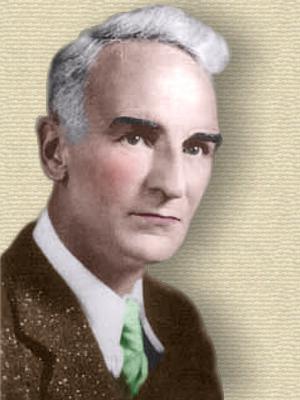
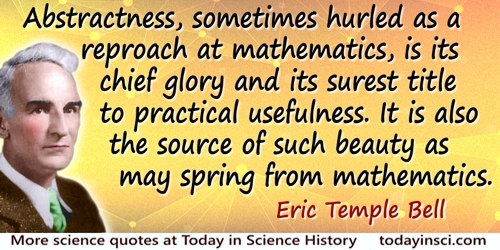
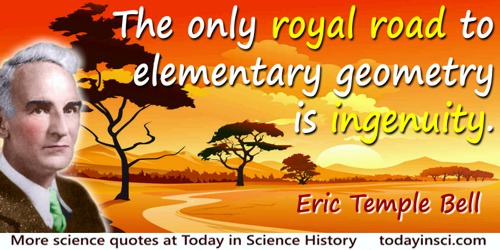
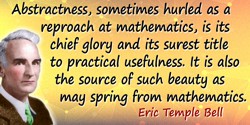
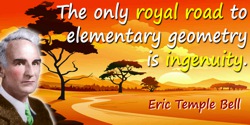
 In science it often happens that scientists say, 'You know that's a really good argument; my position is mistaken,' and then they would actually change their minds and you never hear that old view from them again. They really do it. It doesn't happen as often as it should, because scientists are human and change is sometimes painful. But it happens every day. I cannot recall the last time something like that happened in politics or religion.
(1987) --
In science it often happens that scientists say, 'You know that's a really good argument; my position is mistaken,' and then they would actually change their minds and you never hear that old view from them again. They really do it. It doesn't happen as often as it should, because scientists are human and change is sometimes painful. But it happens every day. I cannot recall the last time something like that happened in politics or religion.
(1987) -- 


